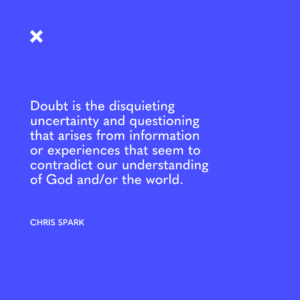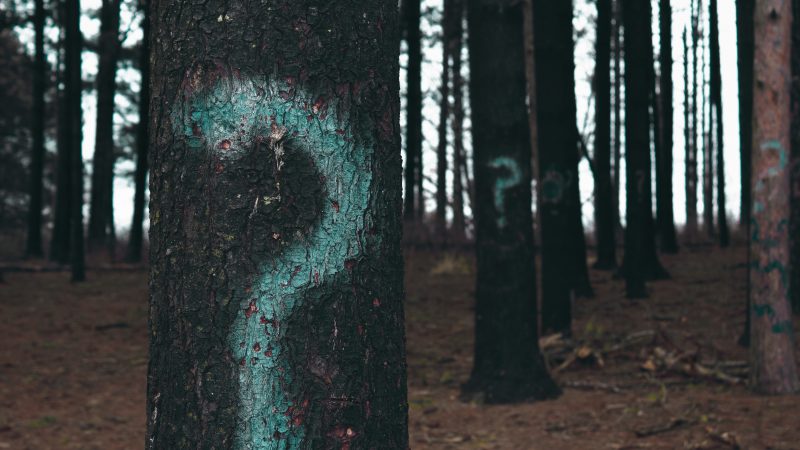Youth Resource
What is the place of doubt in a life of faith?
Doubt is a normal part of a life of faith because a coming to faith should involve not just emotions but also our minds. To wrestle with doubt can actually help strengthen faith, as well as guard us from the dangers of dogmatic certainty.
Videos
-
The role of doubt in a life of faith
William Lane Craig on how some doubt is actually part of a life of committed faith.
Transcript
SIMON SMART: To what extent does some doubt play a role in a life of committed faith?
WILLIAM LANE CRAIG: I think that traditionally Christians theologians and ordinary believers have understood that doubt actually is part of the life of faith. Very often great saints of God have gone through what they call ‘the dark valley’, in which God may not seem real to them and they trust in God to get them through that dark valley and bring them out on the other side. And this is not inimical to faith, or contrary to faith, this is a part of the life of faith. The trust in God just as Job in the Old Testament trusted in God as he went through terrible suffering and loss. And this isn’t a blind or irrational faith – on the contrary, in those moments where we go through the dark valley it can be helpful to remember all of the good reasons and evidence for God’s existence, that our faith is not based just on emotions, but it’s based upon the truth, and therefore we can trust God to help get us through those difficult times.
close -
Doubt and Grace
Francis Spufford explains that far from being its enemy, doubt can often illuminate faith.
Transcript
FRANCIS SPUFFORD: In some ways, the more intense your relationship with faith is, the more intense your relationship with doubt tends to be too; they’re coordinated like clothing, or they’re dancing partners, pick your metaphor. The metaphor that isn’t right, though, is that doubt is the enemy of faith – that’s much too easy. I don’t know any believers who don’t find that doubt is their frequent companion. And actually, doubt defines faith in some ways, faith comes out of struggle with doubt, faith is sometimes illuminated with doubt, faith gets its bright edges from the dark lines of doubt around it. It’s not like we say goodbye to doubt or that we don’t recognise the value of scepticism, but our questions pull back towards that core sense of being nourished from the centre of faith.
close -
Facebook Forum: Doubt and Faith
Tom McLeish responds to a question submitted on Facebook about whether he ever has doubts regarding his faith.
Transcript
SIMON SMART: Cecily Thew Patterson asks this: Do you personally have doubts regarding your faith and if so, what are they based on?
TOM MCLEISH: Cecily, thank you. I think we all have personal doubts. I have a good go at being an atheist every so often. It’s a little discipline that I exercise. But that’s not a doubt, it’s a self-enforced doubt. I make myself have doubts because I want to do sanity checks the whole time. Maybe all my atheist colleagues and friends are right. So, let me go and jump into their world system as much as I can and believe it and ask – is this making sense? Perhaps in answer to the previous question – that will be the thing that one day I will think, ah yes, this is better or no, this is clearer, I can see much clearer now. I think that is a risk that those who are honest about our faith commitments really have to take. I have doubts about how well I’m obeying God, how well I’m carrying out his command to love my neighbour as myself, to love him. I have huge doubts about how well I’m doing that. But we all have those doubts and we all need to go through the experience of being forgiven and getting up on our feet again every day.
close -
On doubt and certainty
Craig Calhoun argues for the importance of humility in the public sphere.
Transcript
One thing to think about when we consider religion in the public sphere is whether our experience of religion is dogmatic certainty or doubt, and hope that we’ll understand better. There are settings in which certain kinds of religious people – some very fundamentalist Christians, and atheists – both get along with each other and are more commonly represented. And the common denominator is certainty, so that atheists and fundamentalist religious people share an idea of absolute certainty.
But many religious people have an attitude of doubt, an attitude of desiring more confidence, of wanting to learn more deeply, and therefore a basic religious attitude of humility. I can’t understand everything that God is or wants, and therefore I can’t be absolutely dogmatically certain about anything. And I think this is often forgotten. But it’s basic to the public sphere, because the public sphere isn’t just people shouting from different positions of dogmatic certainty, it is people engaged in more nuanced conversations where each is humble enough to know that he or she doesn’t have the whole truth.
close
Articles
Engage
- In pairs, share a story of a time in your life when you started to doubt something you believed (this doesn’t have to be a “big” thing like faith in God – it could be anything).
- Do the Colour-Symbol-Image Thinking Routine for the word doubt.
- Read the following definitions of doubt (as it relates to the Christian faith) from Chris Spark and Os Guinness, and then write your own definition.


- On a post-it note, write down one doubt you have about the Christian faith.
Understand & Evaluate
- Watch the first three videos (The role of doubt in a life of faith; Doubt and grace; and Facebook forum: Doubt and faith) and read the article The pain and beauty of uncertainty.
- Complete the Four Cs Thinking Routine based on what you have watched and read
- Think-Pair-Share your answers to the following questions:
- Do the attitudes towards doubt in these videos and article surprise you?
- How could doubt be beneficial to faith or even “part of the life of faith”?
- If these people have at different times struggled with doubt, why do you think they still believe?
- In the article, Simon Smart says: “The sort of faith that allows no room for doubt may ultimately be frail and limited…Deep faith that honestly wrestles with the murky aspects of life, the parts that cannot be reduced to simple equations, measurable qualities and glib answers may in the end be the most enduring and sturdy of them all.” What is your reaction to this quote?
- Watch the video On doubt and certainty and read the short column What if you’re wrong?. What do Craig Calhoun and Anna Grummitt suggest about the importance of actively choosing a posture of humility and even doubt towards deeply held beliefs? To what extent do you agree or disagree with their views?
Bible Focus
- Read Luke 7:18-28 and answer the following questions:
- What does John the Baptist’s question to Jesus reveal about how John was feeling at this point in time?
- Why is it surprising that John was experiencing doubt? (You may want to read Mark 1:1-11 for some background on John). What circumstance in his life do you think might have caused this?
- How did Jesus respond to John? What does this show us about Jesus’ character and how he responds to doubt in general?
- What does Jesus say about John? Why is this surprising? (Considering that John has just expressed some doubt in Jesus’ identity).
- Write a journal entry from the perspective of John the Baptist reflecting on this incident.
Apply
- Imagine that a friend has shared with you that they are going through a period of doubt about their beliefs. Draft a text message that you could share with them to encourage them, incorporating at least one of the ideas explored in this class.
- Return to your post-it note with the doubt about the Christian faith that you wrote down. Brainstorm ideas about how to wrestle with this doubt further.
- Do you ever interrogate your tightly held beliefs by asking yourself “What if you’re wrong?” Make a list of questions that you think might be helpful to ask about your beliefs (other than the ones already mentioned in Anna Grummitt’s column).
Extend
- Find someone who you know is a Christian (ideally an older person) and record an audio interview with them about doubt and their faith. You could ask questions like: What specifically have they doubted, and when? How did they deal with their doubts? And did their doubts strengthen their faith in the long term?




